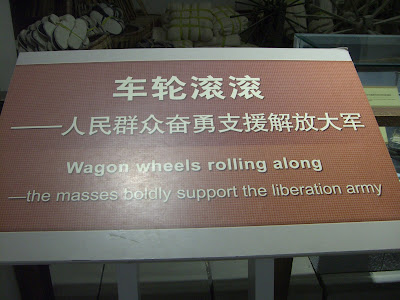Sand dunes in the desert!

The view from my hotel room in Erdos

Riding horses on the grasslands

This week we went to Inner Mongolia. In Chinese it's called Nei Menggu/内蒙古, and it's one of I think 5 or 6 Autonomous regions in China. I'm not exactly sure what autonomous means in China, but I think it just means that instead of Beijing appointing their governor, they appoint it themselves. But don't quote me on that, I'm just purely guessing. Anyways, we went there because it was exam week at Jingshan, and every year the group takes a short trip around this time.
We visited the grasslands, Hohhot (the provincial capital, called Huhehaote/呼和浩特 in Chinese), Erdos, and the Gobi desert. The best parts were Hohhot and the desert.
In the grasslands we stayed in a yurt hotel, meaning that instead of a building with rooms it was a bunch of yurts with beds in them. That sounds really cool, except they were freezing at night. The grasslands themselves were also not so great. We rode horses to three different "sites" on the grasslands. The horses went no more than 2 mph, and the "sites" we saw were a lake that looked more like a giant puddle, some sort of delapidated Buddhist shrine, and a lake that had no water in it because it didn't snow last winter. There was also a killer goat that rammed us in the shins. Altogether a really awesome experience.
Hohhot was really cool. We were all anticipating an industrial wasteland, and what we got was actually a pretty cool, bustling city. We walked around after dinner, and Hohhot is a really cool place to see after dark. There was a large plaza right by our hotel which was full of people and activity. There was also a jumbo tron showing the new Wolverine movie, which as you probably know was leaked online a month or so ago and has since then penetrated every corner of China to the point where I think everyone has at least seen it being sold on the street for 5 yuan. I bought it, and I have to say, if you're going to pay anything, it's really only worth the $.73 I paid for it. Anyways, if you're ever in Inner Mongolia, I recommend spending at least one night in Hohhot.
Erdos was a different story. Apparently it's the richest city in the province because of the coal mines, but you wouldn't guess that from walking around. When we went walking around after dinner, we heard several screams and saw some really sketchy looking stores. Erdos really fits the definition of industrial/nuclear wasteland. I feel really bad for everyone who lives there. If there are a bunch of rich people there, they're not sharing the wealth very much.
The Gobi desert was a ton of fun. When I heard we'd be "playing in the desert" for a few hours, I was really curious what that meant. Afterall, how does one "play" in the desert? It's just a bunch of sand, right? Wrong! China has the savvy to turn the desert into a tourist attraction, full of fun things to do that you have to pay for. I rode an ATV, "drove" a stick shift go-cart thingy, slid down a hill of sand, climbed back up the hill, and saw a Mongolian wedding. It was all really fun, but in the end I had sand everywhere, and couldn't even shower because that night we got on the train back to Beijing.
All in all, Inner Mongolia was pretty cool. I really liked Hohhot and the desert, and although the grasslands and Erdos weren't great, I still had a good time. It's worth a stop the next time you're in China.































